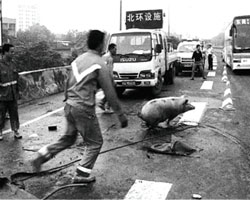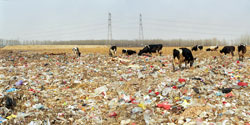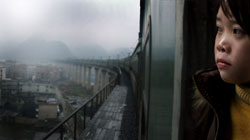 |
In Huang Weikai's meticulously crafted documentary Disorder (2009), the omniscient deity is a MetLife dirigible floating above the megalopolis of Guangzhou, while the emphatically uninsured life of the city unravels, skein by strained skein, one madness at a time. After all, somebody has to watch over the miasma that is any city overwhelming its physical, moral and spiritual extremes. Disorder is part of a festival of independent documentary films from China being shown this weekend in Kathmandu.
The film opens with a spontaneous, gushing fountain in a busy street. Water soars high. It is something joyous, it recalls a more pure kind of ambition. When it falls, it breaks into beads, makes the oldest music on earth. Soon, two sleek cars square off under the fountain. A bystander explains: "They're fighting for a turn." A turn to wash the car under the thick downpour. "That is expensive water," another bystander says.
 |
A man stands on the brink of a bridge, the river to his back, brandishing a banner with demands. The chief of police must come and talk to him, or he will jump. "Why can't you guys help me?" he demands from the policemen watching him, but they seem merely annoyed � you got the publicity you wanted, they say. The stubborn man won't budge. He is threatening suicide, but he has stripped down to his shorts. Where are his pants? His shoes? He must have put them aside, neatly folded, so he can go home after his suicide. He blinks in the afternoon sun, a little miffed at the inattention, a little bored with his own pantomime. He is fighting the system, but the system refuses to register his rage. Thus, the tension dissipates, his protest is rendered quotidian, banal.
 |
A cockroach in a bowl of noodle soup in a restaurant leads to a moment of Kafkaesque density. The customer picks the bug with chopsticks, cradles it in the soup spoon, gingerly returns it to the bowl and waits for the hygiene inspector, who embarks upon a carefully weighed observation: "There is no telling how this cockroach got here. Each person has his own version of what happened."
The documentary filmmakers' 'objectivity' isn't any different from how a cat toys with a mouse: the hapless, sometimes quixotic, often helpless subject is always too close, much too interesting to not paw it out of a sadistic need to see what happens next. Even if it is a baby girl abandoned by a bush, along what appears to be a busy path. A woman with a little girl tries to feed the baby some leftover formula in the girl's bottle, but the formula has curdled. The woman asks her toddler, "You want to take the baby home?" The child waddles away from the baby. "She won't drink the milk. Let's go," the woman says, and is gone.
What sort of a hell reduces an abandoned baby into a roadside attraction, a pet to be petted and fretted over for a minute or two, before going home to cook dinner? The ending of Disorder is perhaps the most disturbing sequence � here is injustice, heroism, terror, helplessness, the ineffectualness of a brutish system that can't fathom why the weak will come forth to defend others just as weak, and is hell-bent upon keeping the outsiders out, keeping the poor more poor, while SUVs square-off to wash their cars under the geyser gushing from a broken water mains. Here we see how thin the veneer of order is, and how many it takes to restrain one individual angered beyond patience. How hard it is to keep just one man down, on orders, under threat, if he decides to stand.
China Expose
Yala Maya Kendra, Patan Dhoka
18-19 August
www.filmsouthasia.org/newsevent/newseventid-17
Timings:
Super, Girls!
Dir. Jian Yi (attending)
2007. 73min.
By invitation only
Searching for Lin Zhao's Soul
Dir. Hu Jie (attending)
2004. 115 min.
18 August, 1pm
Petition
Dir. Zhao Liang
2009. 123 min.
18 August, 4pm
Beijing Beseiged by Waste
Dir. Wang Jiuliang
2011. 72 min.
18 August, 6.30pm
Disorder
Dir. Huang Weikai (attending)
2009. 52 min.
19 August, 4pm
Last Train Home
Dir. Fan Lixin
2009. 87 min.
19 August, 6pm


